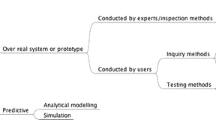Abstract
This paper aims to present the results of a systematic review focused on usability evaluation methods for serious games (SG) of mobile devices applicable to health care. The research questioned which usability evaluation methods have been available for mobile serious games. The research was conducted into four databases (ACM, IEEE, Science Direct and Springer) in two periods (23–30 March, 2015, and 01–07 June, 2016). After evaluating 2191 papers, the researchers considered that 9 met the eligibility criteria. As a result, similarities between some methodologies used have been found, however a specific methodology for SGs usability evaluation applicable to health has not been encountered.

Similar content being viewed by others
References
Wiemeyer, J., Kliem, A.: Serious games in prevention and rehabilitation—a new panacea for elderly people? Eur. Rev. Aging Phys. Act. 9, 41–50 (2012)
Carvalho, S., Ishitani, L. Fatores motivacionais para desenvolvimento de mobile serious games com foco no público da terceira idade: uma revisão de literatura. Educação Temática Digital (2013)
Sánchez, J., Olivares, R.: Problem solving and collaboration using mobile serious games. Comput. Educ. 57, 1943–1952 (2011)
ABNT Catálogo, (2015). http://www.abntcatalogo.com.br/norma.aspx?ID=86090
Moreno-Ger, P., Torrente, J., Hsieh, Y.G., Lester, W.T.: Usability testing for serious games: making informed design decisions with user data. Adv. Hum. Comp. Int. 2012, 13 (2012). doi:10.1155/2012/369637
Procci, K., Chao, A., Bohnsack, J., Olsen, T., Bowers, C.: Usability in serious games: a model for small development teams. Comput. Technol. Appl. 4, 315–329 (2012)
What is a systematic review? The Campbell Collaboration, (2015). http://www.campbellcollaboration.org/what_is_a_systematic_review/
Sampaio, R. F., Mancini, M. C. Estudos De Revisão Sistemática: Um Guia Para Síntese Criteriosa Da Evidência Científica. Revista Brasileira de Fisioterapia. (2007)
Clawson, J., Patel, N., Starner, T.:Dancing in the streets: the design and evaluation of a wearable health game. In: International Symposium on Wearable Computers, Oct 2010
Arteaga, S.M., González, V.M., Kurniawan, S., Benavides, R.A.: Mobile games and design requirements to increase teenagers’ physical activity. Pervasive Mob. Comput. 8, 900–908 (2012)
Barros, A.C., Leitão, R., Ribeiro, J.: Design and evaluation of a mobile user interface for older adults: navigation, interaction and visual design recommendations. Procedia Comput. Sci. 27, 369–378 (2014)
Brown, D.J. et al.: Designing location-based learning experiences for people with intellectual disabilities and additional sensory impairments. Comput. Educ. 56, 11–20 (2011)
Brown-Johnson, C.G., Berrean, B., Cataldo, J.K.: Development and usability evaluation of the mHealth Tool for Lung Cancer (mHealth TLC): a virtual world health game for lung cancer patients. Patient Educ. Couns. 98, 506–511 (2015)
Sunwoo, J., Yuen, W., Lutteroth, C., Wünsche, B.: Mobile games for elderly healthcare. in Proceedings of the 11th International Conference of the NZ Chapter of the ACM Special Interest Group on Human-Computer Interaction 73–76 (ACM, 2010)
Schmitz, B., Klemke, R., Walhout, J., Specht, M. Attuning a mobile simulation game for school children using a design-based research approach. Comput. Educ. 81, 35–48 (2015)
Tong, T., Chignell, M., Sieminowski, T.: Case study: a serious game for neurorehabilitation assessment. Procedia Comput. Sci. 69, 125–131 (2015)
Pirani, E.Z., Bulakiwala, F., Kagalwala, M., Kalolwala, M., Raina, S.: Android based assistive toolkit for alzheimer. Procedia Comput. Sci. 79, 143–151 (2016)
Acknowledgements
The authors are grateful to Brazilian National Council for Scientific and Technological Development for their support (Process numbers 444088/2014-8 e 303618/2015-9).
Author information
Authors and Affiliations
Corresponding author
Rights and permissions
About this article
Cite this article
Schmidt, J.D.E., De Marchi, A.C.B. Usability evaluation methods for mobile serious games applied to health: a systematic review. Univ Access Inf Soc 16, 921–928 (2017). https://doi.org/10.1007/s10209-016-0511-y
Published:
Issue Date:
DOI: https://doi.org/10.1007/s10209-016-0511-y




